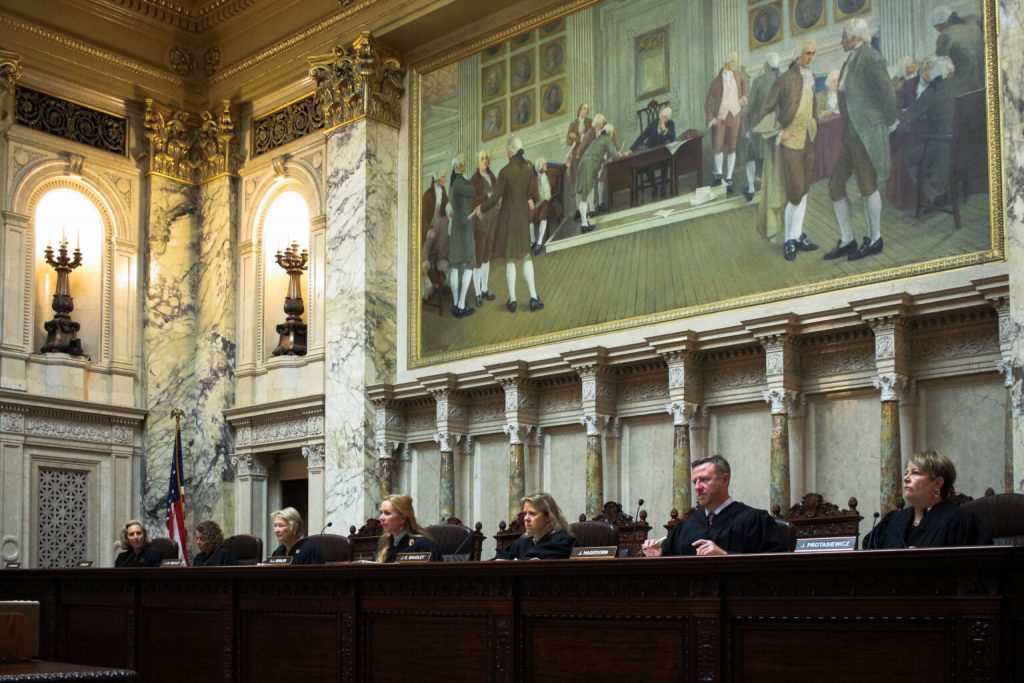Wisconsin Supreme Court Accepts Abortion Rights Cases
Both would advance abortion rights. Justices already bickering about cases.

The seven members of the Wisconsin Supreme Court hear oral arguments. (Henry Redman | Wisconsin Examiner)
The Wisconsin Supreme Court on Tuesday ruled that it would hear two cases filed by Attorney General Josh Kaul and Planned Parenthood that will determine if Wisconsinites have a right to abortion care.
The cases, accepted concurrently, ask if the state’s 1849 law widely seen as banning abortion actually does so and if abortion is a right protected by the state Constitution.
Additionally, the Court ruled that it would not allow the state’s three largest anti-abortion groups to intervene in the lawsuits, finding that just having an interest in a hotly debated issue is not enough to clear the legal bar of joining a lawsuit as a non-party. The groups, Wisconsin Right to Life, Wisconsin Family Action, and Pro-Life Wisconsin, will be allowed to file amicus briefs.
“Merely propounding a general position on a topic of debate in society, lobbying for that position, or wishing to make legal arguments consistent with that position does not give them a legal claim or defense that is sufficient to support permissive intervention,” the Court’s order states. “Moreover, if we were to permit intervention by the Proposed Intervenors, there would be no logical distinction that would preclude intervention by all of the many other lobbying and education organizations on both sides of the abortion debate.”
Conservative Justice Brian Hagedorn concurred with the decision to not allow the groups to intervene.
The U.S. Supreme Court’s 2022 decision to strike down Roe v. Wade, the precedent that had guaranteed the right to an abortion, triggered Wisconsin’s 1849 law, which states that anyone “other than the mother, who intentionally destroys the life of an unborn child is guilty” of a felony. Days after that decision, Kaul filed his lawsuit against the District Attorneys of Dane, Milwaukee and Sheboygan counties, the locations of the state’s three Planned Parenthood clinics.
Last year, a Dane County judge ruled in the case, Kaul v. Urmanski, that the law actually applied only to feticide and not consensual abortions. Sheboygan County District Attorney Joel Urmanski appealed the decision, requesting that the state Supreme Court allow the case to bypass the appellate level.
The other lawsuit, filed in February by Planned Parenthood, two abortion providers and a group of anonymous women who have received abortions, asks the Court to find that the state Constitution’s right to equal protection grants a right to receive an abortion and a doctor’s right to provide one. The suit, Planned Parenthood of Wisconsin v. Urmanski was filed as an original action, beginning at the Supreme Court level without first being heard by lower courts.
This is the fourth original action the Court has accepted this term. During the 2020-21 term the Court, under a conservative majority, accepted three original actions and in the 2019-20 term it accepted seven.
Prior to the order’s Tuesday release, a draft version of the order was leaked to Wisconsin Watch, an act that drew calls from the justices for an investigation by law enforcement.
“Today the entire court was shocked to learn that a confidential draft document was ostensibly leaked to the press,” Chief Justice Annette Ziegler said in a statement. “I have contacted law enforcement to request that a full investigation be conducted. We are all united behind this investigation to identify the source of the apparent leak. The seven of us condemn this breach.”
Like many of the Court’s actions this term under a liberal majority, the decision Tuesday drew the ire of conservative justices who accused the majority of partisanship.
In a dissent that included screenshots of social media posts, Justice Rebecca Bradley accused the Court’s four liberals of pre-determining the case’s outcome and called for Justice Janet Protasiewicz to recuse herself from the case because of comments she made on the campaign trail that she personally supports abortion access.
“By granting this petition, Ann Walsh Bradley, Rebecca Frank Dallet, Jill Karofsky, and Janet Protasiewicz continue their crusade to impose their values on the people of Wisconsin, wielding raw political power constitutionally vested in the legislature alone,” Bradley wrote. “The people of Wisconsin never consented to unchecked rule by four lawyers who continue to disgrace the institution of the judiciary by entangling this court in policy issues constitutionally reserved to the People and their legislative representatives. This case again marks the court’s perilous entrance into the political arena where it does not belong and further delegitimizes this court as a non-partisan institution.”
In a concurrence responding to Bradley’s attacks, Karofsky defended herself and her liberal colleagues, writing that Bradley herself has acted similarly on her campaigns and when she was in the majority.
“Justice Rebecca Grassl Bradley engages in ad hominem attacks that would be more at home in an ill-advised late-night rant on social media than in a judicial writing — including attempts to paint the court as illegitimate, cell phone screenshots of celebrity tweets, and calling members of the majority — the horror — ‘lawyers,’” Karofsky wrote. “How can Justice Rebecca Grassl Bradley have standing to criticize a colleague for signaling her values on the campaign trail while she did that on her own? How can she call for the recusal of one of her colleagues when she herself voted against a stronger recusal rule while in the majority? And how can she complain about the court granting an original action petition when in the past she too voted to grant original actions tackling controversial constitutional issues?”
The orders issued Tuesday set deadlines for parties to file briefs in the two cases but don’t set a schedule for oral arguments.
Wisconsin Supreme Court accepts abortion rights cases was originally published by Wisconsin Examiner.






















Republicans. Gotta love ’em. Far too many, including GOP-leaning WI State Supreme Court AND United States Supreme Court justices believe the interpretation of laws is their playground, and they have the right to interpret them to the benefit of their own political leanings.
All justices should regularly be reminded that their primary goal is “EQUAL JUSTICE UNDER LAW”.
Rebecca Bradley seems to believe that only conservatives have the right to impose their values on the people of Wisconsin even when the people oppose those values. It is telling that Justice Janet won her seat (flipping the court from a conservative to progressive majority) so convincingly. Bradley is shedding crocodile tears because she no longer has the power to impose her irrational arguments.
What is happening now with the Wisconsin Supreme Court is a much needed course correction after years of conservative judicial nonsense.